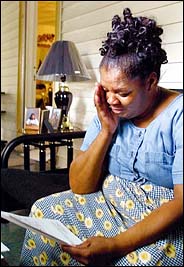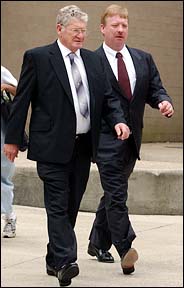May 13, 2002
In One Last Trial, Alabama Faces Old Wound
By RICK BRAGG
 |
| Nicole Bengiveno/The New York Times |
| Eunice Davis, whose sister died in the 1963 bombing, said of the murder suspect's trial that recently began, "Everybody will know what happened." |
 |
| Nicole Bengiveno/The New York Times |
| Mrs. Davis held photographs of herself at age 9, left, and her sister Cynthia Wesley at 6. Cynthia was 14 when she died in the bombing of the 16th Street Baptist Church in Birmingham, Ala.
|
 |
| Associated Press |
| Bobby Frank Cherry, left, who is on trial charged with murder, with his lawyer Rodger Bass. |
BIRMINGHAM, Ala., May 10 — The question lingers here, like a faded slogan on the side of a barely remembered department store, or a whiff of tar-scented smoke from the steel mills that have mostly closed or rusted down.
How many?
How many men were involved in the bombing of the 16th Street Baptist Church on Sunday, Sept. 15, 1963? How many men, linked to a violent klavern of the Ku Klux Klan in a city that routinely shook with bombs, knew about the plan to plant the dynamite that blew through the church basement and killed four girls?
When it was over, when word spread of the murders of Denise McNair, Carole Robertson, Cynthia Wesley and Addie Mae Collins, how many of those men slapped the bombers on the back, bought them a beer or barbecue, and formed a circle of silence that protected them, for years and years?
"You live through it, and, if you can, you live above it," said Alpha Robertson, Carole Robertson's mother. "You can't waste a life hating people because all they do is live their life, laughing, doing more evil."
So you wait, said the 83-year-old Mrs. Robertson, as decades pass, as first one suspect, then a second, is found guilty, as a third suspect dies untried.
Finally, there comes the trial of Bobby Frank Cherry, now 71, the last of the primary suspects in the bomb blast that killed her teenage daughter and the three other girls, in the most shameful incident of the civil rights struggle.
"The last," she said, as a quick, humorless laugh rose in her throat. At least, she said, he is "the last one they can get."
State prosecutors and defense lawyers were expected to select a jury by Monday, and opening statements could begin as early as that afternoon in the murder trial of Mr. Cherry, a former truck driver and white supremacist, and a suspect for 38 years in the murders of Denise, 11, and of Carole, Cynthia and Addie Mae, all 14.
It is expected to be the final attempt by the State of Alabama to bring to justice a living suspect in that bombing and, in the process, cleanse itself of a stain on its history. But in the old black neighborhoods in a new-looking city of downtown skyscrapers and vast suburban sprawl, there is a sadness too severe, too profound, to correct with a courtroom, and a pain as new as yesterday.
"Closure? I have often wondered why they associate that word with this affair," Mrs. Robertson said. "For those who are not involved, it is easy to say that."
Certainly, she said, "justice is due."
"Closure," she said, "is just a word."
It may also be the last trial, or certainly one of the last, of its kind, said experts on the civil rights movement, as well as people who lived it. Time is running out, for suspects, the witnesses, the surviving victims, everyone.
But few cases carry the historic or emotional charge of the 16th Street Baptist Church bombing. Alabama courts convicted Robert E. Chambliss, in 1977, and Thomas E. Blanton Jr., last year, on murder charges related to that crime. Another suspect, Herman Frank Cash, died in 1994.
While others may have been involved, in the crime or the cover-up, only Mr. Cherry remains of those linked by state and federal investigations to the actual design or placing of the bomb.
"They want to close it up with him," said Sarah Collins Rudolph, who lost an eye in the explosion that killed her sister, Addie Mae. "Him, with one foot in the grave."
That is not fair, she said, "He's done lived."
Mr. Cherry, who lived in Birmingham during the 1960's and left for Texas in the 1970's, has denied any involvement in, or knowledge of, that bombing, and his lawyers are expected to portray him as a feeble old man who suffers from dementia.
Family members have repeatedly sworn that he could never have done the thing he is accused of. But estranged relatives have said they heard him talk of his involvement in the bombing.
Prosecutors are expected to paint him, through the testimony of people who knew him in the summer of 1963 and the investigators who followed the case, as a man who believed that violence could keep blacks in their place in Birmingham, a man mean enough to bomb a church on a Sunday morning.
For many people here, the confrontation is not one of lawyers and judges and courtroom files.
It is a matter of good and evil, and heaven and hell.
As the decades slipped by, every day reminded older black people here of the deep hatreds that allowed the bombing to happen, the racial attitudes that devalued the lives of the four girls, and the investigations that were botched or delayed.
"The Bible says that in the last days, all this evil stuff will come out," Mrs. Rudolph said. "They thought they had got away with it, but God will bring it out."
What the jury decides, in this last case, does not matter so much. "He's got to stand before the Lord," Mrs. Rudolph said. "And he's going to lift up his eyes in hell."
But there are few people here, especially among those touched most cruelly by the bombing, who believe Mr. Cherry should not be tried.
"Everybody will know what happened," said Eunice Davis, who is Cynthia's sister.
It will be part of history, say some older black people in Birmingham, not just something people here in Birmingham know, and have always known.
"Now they say he's got heart trouble and confused in his mind," Mrs. Davis said. "Back then, we didn't go out at night" because of the threat of the bombs and the men who set them.
The church, three months before the bombing, had been headquarters for the historic civil rights marches led by the Rev. Dr. Martin Luther King Jr., making it a target.
The bomb, made from dynamite, exploded at 10:19 a.m.
"Boom," Mrs. Rudolph said, and then the glass and brick sang through the basement where she and the other girls had gathered. A piece of it stabbed her eye, and other pieces shredded her face and chest.
None of the girls who died had marched in Dr. King's now famous "children's crusade." They were just at church.
From the start, powerful men derailed the investigation. Col. Albert J. Lingo, a George Wallace appointee, director of the Alabama Department of Public Safety and suspected Klan sympathizer, seemed obsessed with blaming black Muslims for the bombing.
Later, an F.B.I. memorandum in May 1965, addressed to J. Edgar Hoover, named the suspects. "No avenue of investigation has been overlooked. As a result, it is apparent that the bombing was the handiwork of former Klansmen Robert E. Chambliss, Bobby Frank Cherry, Herman Frank Cash, Thomas E. Blanton." It went on to name a fifth suspect who was "probably" involved.
Saying that the chances for conviction were "remote," Mr. Hoover ordered F.B.I. agents not to meet with state or federal prosecutors, not to share their findings. It would be years before anyone paid.
First, it was Mr. Chambliss, known as Dynamite Bob, a former member of the infamous Eastview 13 Klavern in Birmingham, a group believed to have been involved in practically every major incident of racial violence in Alabama from 1961 to 1965.
The investigation was built largely on the testimony of women who had been married to or otherwise related to the bombers, including one woman who heard Mr. Chambliss declare, "Just wait till Sunday morning, and they will beg us to let them segregate."
He was convicted in November 1977, by an Alabama attorney general named Bill Baxley who, as a law student at the time of the blast, had written the names of the four girls on a card in his wallet, so he would not forget them.
But even to shorten his life sentence, Mr. Chambliss would not inform on his friends, and he died in prison in 1985. When Mr. Cash died in 1994, it left only Bobby Frank Cherry and Thomas E. Blanton Jr.
Mr. Blanton was convicted in May of last year, on a combination of witness testimony — much of it about his hatred of blacks — and taped conversations in which he discussed how to make a bomb.
Mr. Cherry's case, too, is expected to be decided on mostly circumstantial evidence, and the jury's decision may come down to whose witnesses have the most impact, lawyers and legal experts say.
But in an emotional trial, legal experts point out, that could be enough to convict Mr. Cherry.
"I call them atonement trials," said Jack Davis, a professor who teaches on the civil rights movement at the University of Alabama at Birmingham.
Both prosecutors and defense lawyers are under orders not to discuss the case by the presiding judge, James Garrett of Jefferson County Circuit Court. But it would be wrong to say, said people here, that the city is abuzz over the trial. Many whites said they want to see justice done, some say they believe the old man should be left alone, and others say they want nothing to do with it — that it is just one more reason to dig up the city's sometimes violent past.
Black people here, of course, tend to support the state's decision to try Mr. Cherry. But no one feels it, as Mrs. Robertson said, like the people who felt it firsthand.
Mrs. Rudolph is a housekeeper now, the sight in her one good eye slowly dimming. Recently, a doctor found a piece of glass in her stomach, and asked her how it got there. The doctor did not know she had been there, the day history was made. "I can't feel it," she said, when asked if it hurt her.
A piece of glass is nothing. "Some people," she said, "have got demons in them."
Copyright 2002 The New York Times Company
![]()